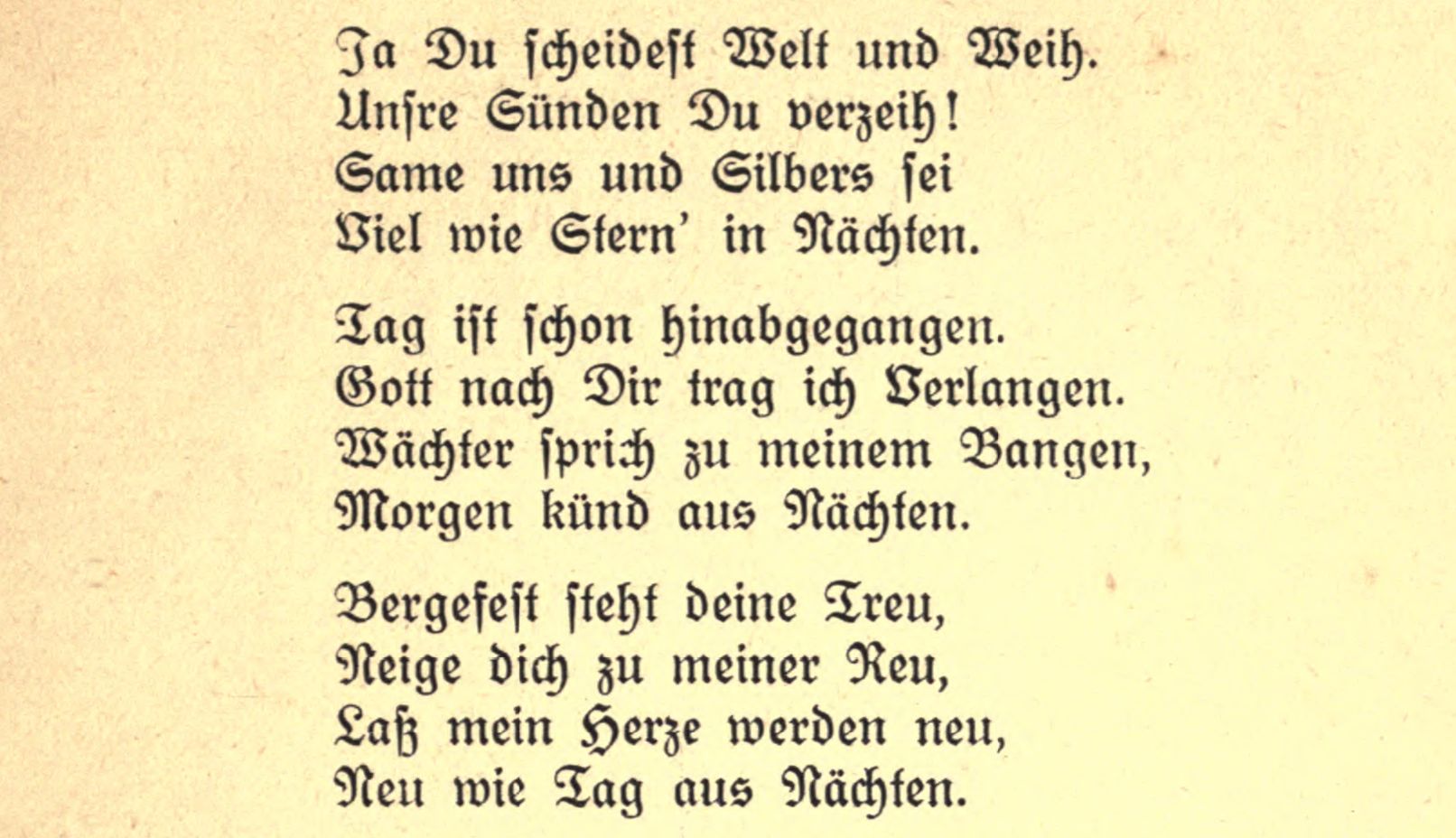The following love poem is one of the Seliḥot recited between Rosh Hashanah and Yom Kippur. Ibn Gayat (1038 – 1089) was not timid about using the most intimate symbols in asking God to become reconciled with us.
| Source (Hebrew) | Translation (English) |
|---|---|
אֵלְכָה וְאָשׁוּבָה אֶל־אִישִׁי הָרִאשׁוֹן. אֲשֶׁר מֵאָז נְצָרַנִי כְאִישׁוֹן. בָּחוּר כָּאֲרָזִים תְּהִלָּתוֹ בְּכָל לָשׁוֹן. בְּזָכְרִי בוֹ אֵינֶנּוּ מַנִּיחַ לִי לִישׁוֹן: |
I must return to my very first lover, Like an eye’s pupil He kept me safe, Tall is my beloved like a cedar, I can’t sleep when I think of Him. |
גְּאָלַנִי בִּזְרֹעַ מִבֵּין קְדֵשִׁים. גַּם כְּלָלַנִי יֹפִי וְכֵלִים חֲדָשִׁים. דִבֶּר־בִּי עַל־פִּי קְדוֹשִׁים. דִּבְּקַנִי אֶצְלוֹ בִּכְתֻבָּה וְקִדּוּשִׁים: |
How He rescued me from vile hands, How He wed me in all new robes, Speaking to me in holy words, Honoring me with sacred pact. |
הִרְבָּה מֹהַר וּמִקְנֶה וְקִנְיָן. הִגְדִּיל הַשִׂמְחָה בְּכָל־עִנְיָן. וְסִיֵד וְכִיֵר בֵּית חַתְנוּת בִּנְיָן. וּמָסַר לְשָׁרְתֵנִי עֲלָמוֹת אֵין מִנְיָן: |
Endowering me with ample boon, Amidst many joys, delights supreme, Our tryst He stocked for intimacy, Countless lasses in waiting He set to serve me. |
זֶבַח הֵכִין ושִׁלֵּם נְדָרָיו. זְבָדַנִי זֶבֶד טוֹב בַּחֲדָרָיו. חֲצֵרוֹת קְטֻרוֹת תִּכּוֹן סְדָרָיו. חֲתָנִי הַמֶּלֶךְ הֱבִיאַנִי חֲדָרָיו: |
The choicest foods to fulfill His pledge, In His inner chambers He cleaved to me, While in the courtyards they spiced the air, My Royal Lover took me into His chambers. |
טָבַלְתִּי וּבָאתִי בַּעְדִי עֲדָיִים. טַהֲרוֹתַי נָתְנוּ רֵיחַ דוּדָאִים. יְצוּעִי עָלָה וְלָן בֵּין שָׁדַיִם. יְמִינוֹ חִבְּקַנִי חִבּוּק יָדָיִם: |
And I, bathed, To purity my scent arousing, He mounted our couch and between my breasts, He laid, embraced me and held me… |
כִּמְעַט רֶגַע אִירַע דָּבָר. כָּבוֹד הֵמִיר וְחֹק חַק שָׁבַר. לֶכְתִּי דֶרֶךְ בָּרוּחַ וְלֹא לְהָבַר. לַצְתִּי וְאַצְתִּי וָדוֹדִי חָמַק עָבָר: |
And in the wink of an eye it happened, All broken – betrayed – As I went off with attitude defiant, Mocking, and dazed, my Lover, now disengaged, was gone. |
מֵעַי הָמוּ לְדוֹדִי קָנַנִי. מַה־לִּידִידִי בִּטֵּל אֲשֶׁר הִתְנַנִי. נָסַע מֵעָלַי וְלֹא חַנַּנִי. נְאֻם בִּקַּשְׁתִּיו וְלֹא מְצָאתִיו קְרָאתִיו וְלֹא עָנָנִי. |
My guts wrenched, keening for my Dear One, What was it that I upset? What drove Him away? He is gone now and no comfort left me, How I sought Him to no avail, called Him to no response. |
סוּרָה אֲדוֹנִי סוּרָה חִנַּנְתִּיו כַּמֶּה. סֹב וְלֹא פָנָה הוֹחַלְתִּי עַד מֶה. עָלַי לִבִּי כְּכִנּוֹר יֶהֱמֶה. עֵינִי נִגְּרָה וְלֹא תִדְמֶה: |
“Do turn back, My Lord,” I wailed, He had gone and I waited in vain hope, While my heart cried like a sad violin, My eyes in tears that do not dry. |
פִּקְפֵּק בְּכָבוֹד לְמוֹרַד עֲנִיּוּת. פִּתְחֵי נִדָּה שָׂם נְקִיּוּת. צָנִיף צְנָפַנִי כַּדּוּר דְּחִיּוּת. צְרוּרָה צְעוּרָה אַלְמְנוּת חַיּוּת: |
I lost my dignity, I felt degraded, Besmirched and defiled, foul and dirty, Thrown, tossed about And despised, like a young widow. |
קַוֹה קִוִּיתִי יְיָ יוֹם נֶחָמָה. קִרְבַת נְטוּשָׁה בְּאַף וּבְחֵמָה. רִשְׁפֵי אֵשׁ הָיָה לָּהּ לְחוֹמָה. רַחֵם תְּרַחֵם אֶת־לֹא רֻחָמָה: |
I hoped for the day of comfort, My vulnerable need has turned to frustration, Flames of longing have become a wall, O mercy, please, for one not pitied. |
שׁוּבִי שׁוּבִי הַשּׁוּלַמִּית מִבֵּין שֹׁסַיִךְ. שׁוּבִי וְנֶחֱזֶה־בָּךְ יֹאמַר עֹשַׂיִךְ. תִּקְעִי כַף מִלְּבָנוֹן רָצִיתִי מַעֲשַׂיִךְ. תְּעוֹרֵר אַהֲבָתֵךְ כִּי בֹעֲלַיִךְ עֹשָׂיִךְ: |
Come back, come back, O Shulamit, freed from your hurt, From your desolation, your Maker seeks to behold you, Come quick lift your feet and swiftly come from Lebanon We are reconciled, arouse your love again your Lover will restore you, |
יָדֹעַ תֵדַע פְּנֵי צֹאנֶךָ. צִיּוֹן מִכְלַל יֹפִי הֵטִיבָה בִרְצוֹנֶךָ. חֲסִידֶיךָ רַנֵּן יְרַנֵּנוּ צִדְקוֹת פִרְזוֹנֶךָ. קוֹלִי שָׁמָעְתָּ אַל־תַּעְלֵם אָזְנֶךָ: |
You shall know clearly the face of Your flock Zion, the glorious, grant her the goodness of Your desire Your devotees will sing and acclaim the adventure Yes You heard my voice! You did not avert Your Ear. |
Reb Zalman’s translation was first published at Jewish Renewal Chasidus, here. Many thanks to Gabbai Seth Fishman for helping to make this translation accessible.

“סליחה מר׳ יצחק אבן גיאת | Seliḥah by Yitsḥaq ben Yehudah Ibn Ghayyat (ca. 11th century) translated by Rabbi Zalman Schachter-Shalomi” is shared through the Open Siddur Project with a Creative Commons Attribution-ShareAlike 4.0 International copyleft license.









Leave a Reply